
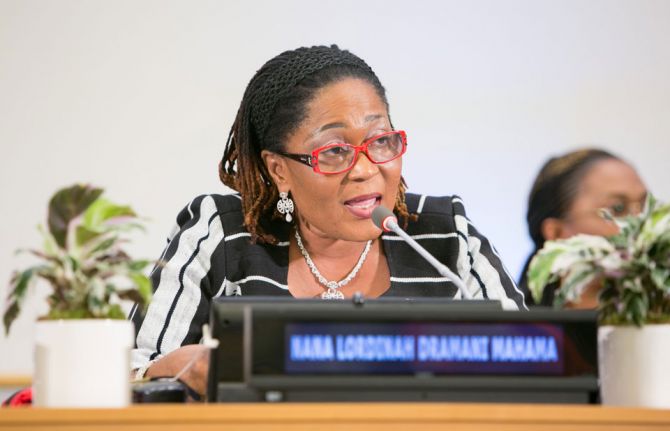
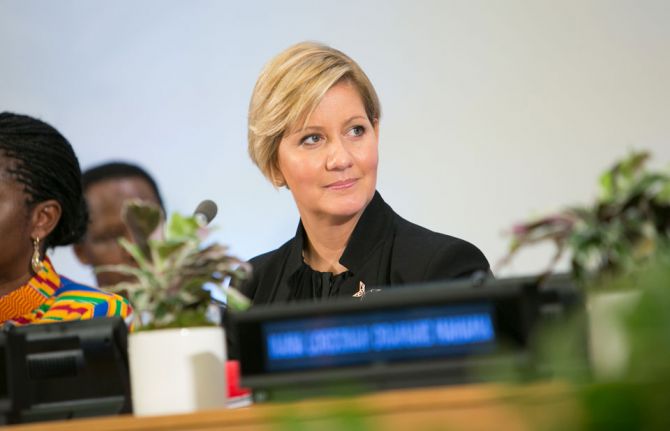
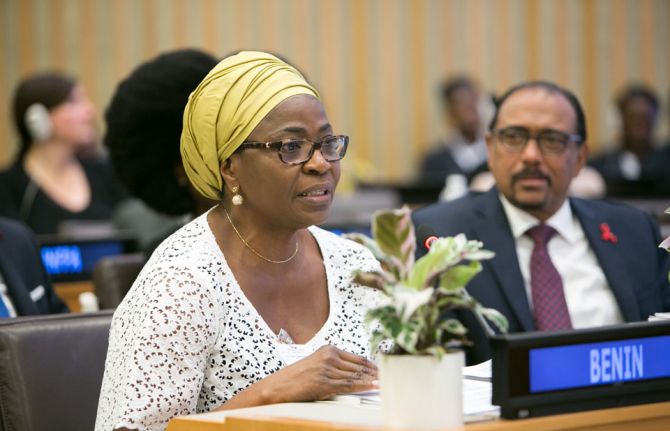
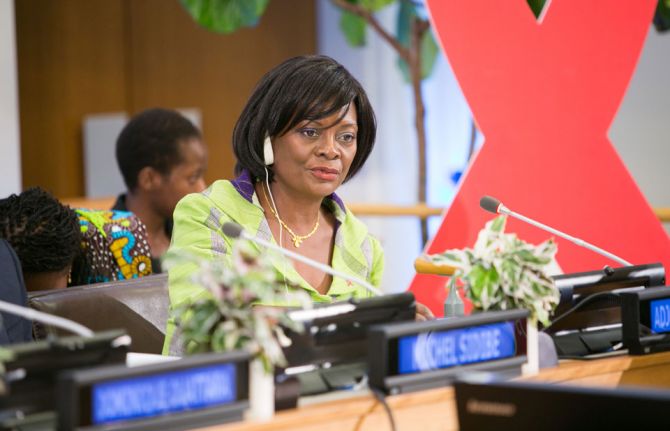
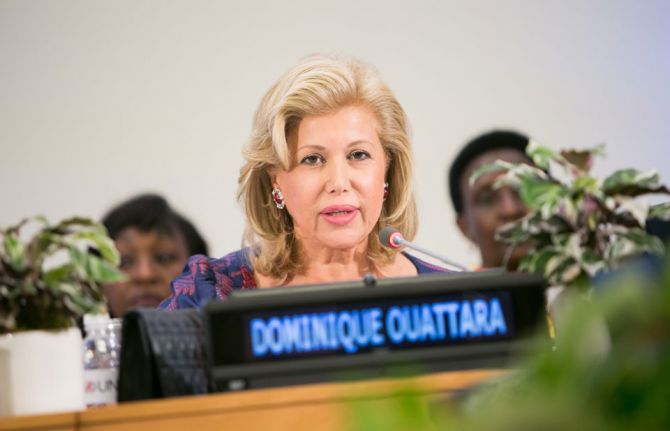
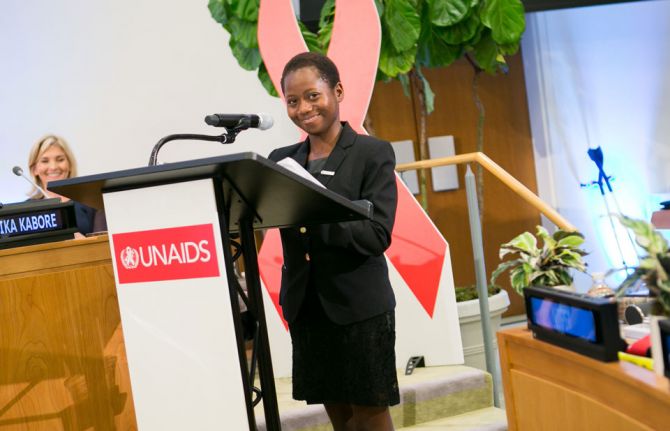
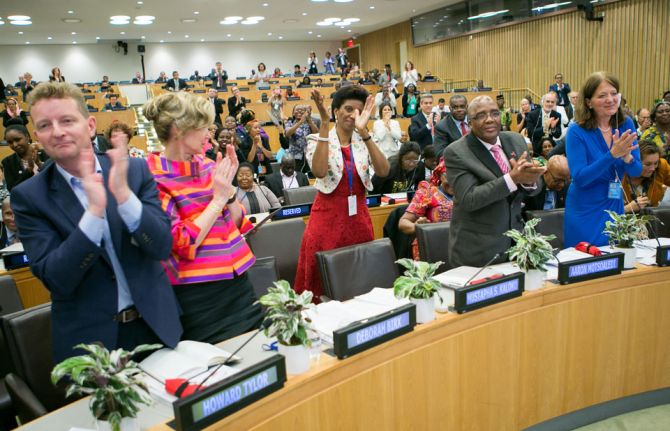
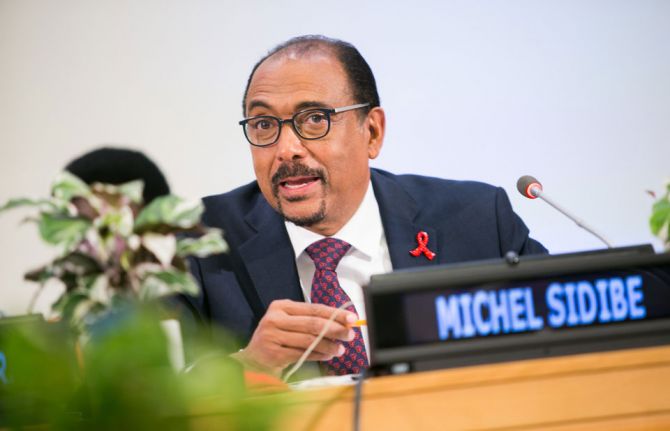
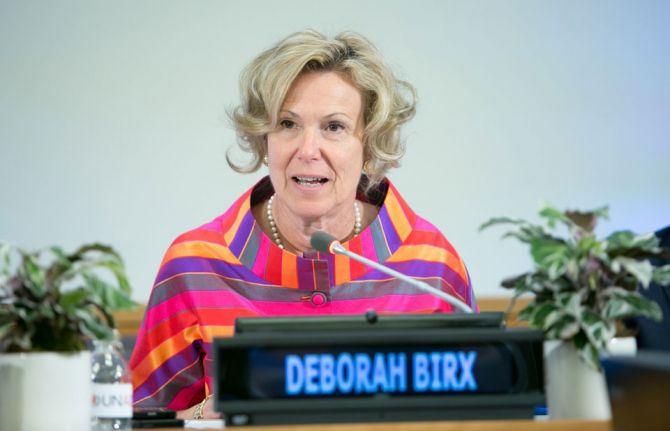
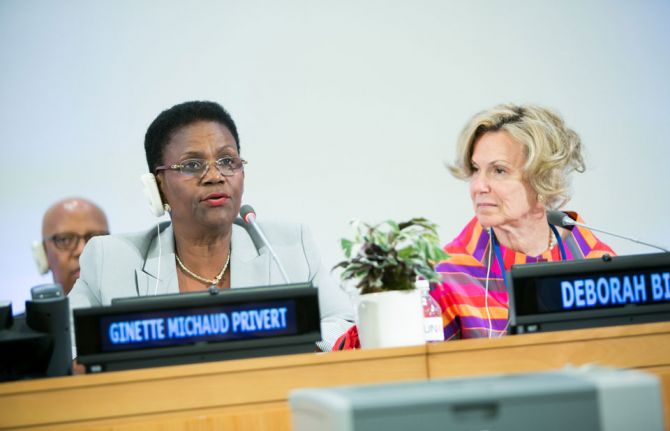
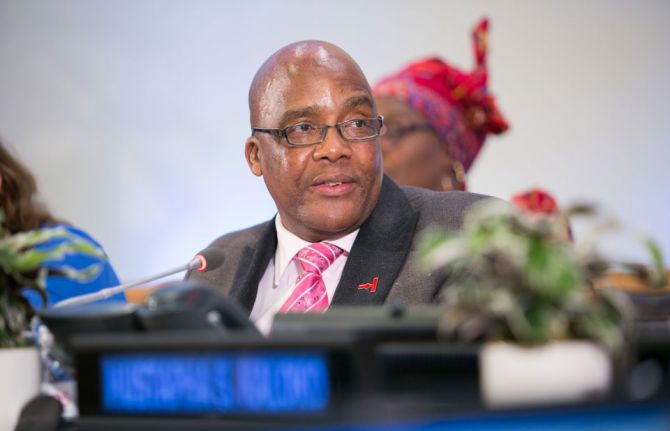
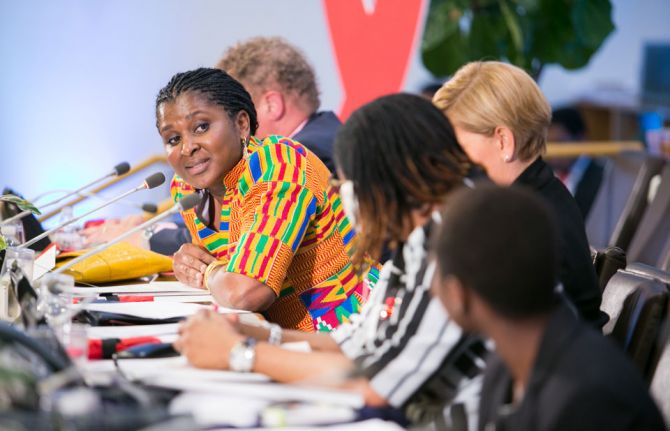
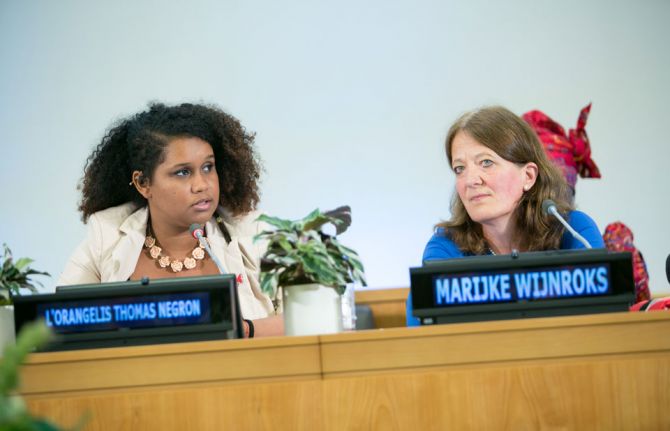
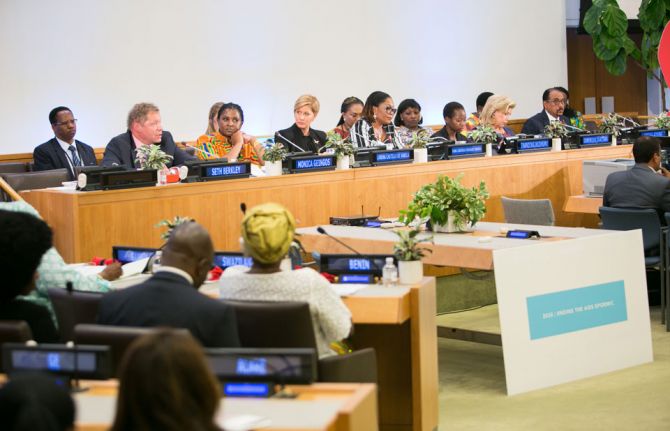
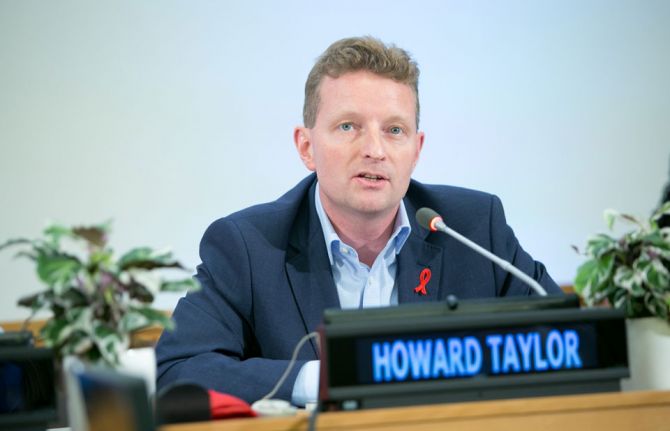
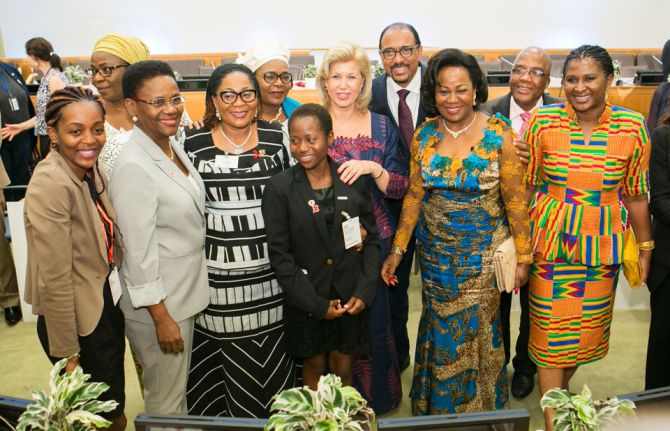
Press Release
Breaking the silos: empowering adolescent girls and young women to access integrated health-care services
09 June 2016 09 June 2016NEW YORK/GENEVA, 9 June 2016—At the United Nations General Assembly High-Level Meeting on Ending AIDS, taking place in New York, United States of America, the Organisation of African First Ladies against HIV/AIDS (OAFLA) has called for the stronger integration of services to improve health outcomes among adolescent girls and young women.
First Ladies from Africa were joined by the First Lady of Haiti and the First Lady of Panama in calling for the empowerment of young women and adolescent girls in the AIDS response. The First Ladies said adolescent girls must assume leadership roles to ensure the development of programmes and policies that are appropriate to their needs and fully respect their sexual and reproductive health and rights. They urged providers of health-care services to better integrate service delivery and programme design to support the ability of adolescent girls and young women to make informed life choices and keep themselves healthy, including by protecting themselves from HIV infection.
Globally, AIDS-related illnesses remain the leading cause of death among women of reproductive age. In 2015, there were an estimated 250 000 [180 000–340 000] new HIV infections worldwide among adolescents (aged 15–19 years), with adolescent girls accounting for 65% of new HIV infections among this age group. AIDS-related illnesses are estimated to be the leading cause of death among adolescents in sub-Saharan Africa. Gender-based violence, gender inequity, harmful gender norms, stigma and discrimination often prevent women and girls from knowing their HIV status and accessing appropriate HIV prevention and treatment services.
The OAFLA session showcased examples of ground-breaking adolescent-centred policies and programmes delivered by governments, adolescent girls and young women, international organizations, the private sector and international donors. The event at the High-Level Meeting on Ending AIDS was organized by OAFLA in collaboration with UNAIDS, Gavi, the Vaccine Alliance, and the United States President’s Emergency Plan for AIDS Relief.
Quotes from speakers
“The Organisation of African First Ladies against HIV/AIDS strongly believes that in moving towards the Fast Track Targets we must ensure that no young girl or boy is left behind. We must address the needs of young people, especially young girls, ending gender inequality and other factors that increase their vulnerability to HIV.” Lordina Mahama, First Lady of Ghana
“Information allows young people to make choices and empowerment is having a choice. I encourage us all to listen to best practice programmes so we can be catalysts and advocates for policies that really work for young women.” Lorena Castillo de Varela, First Lady of Panama
“Despite the progress achieved, we must redouble our efforts. We must offer in a simple way information in relation to HIV infection.” Claudine Talon, First Lady of Benin
“At a time when we are entering a new phase in the AIDS response we need to pay particular attention to women, young girls and infants. We need new strategies to stop violence against women and girls, reduce school drop-outs and end forced early marriage.” Adjoavi Sika Kabore, First Lady of Burkina Faso
“We have to offer communities a package of integrated approaches that include immunization, sexual and reproductive health and rights and education.” Antoinette Sassou-Nguesso, First Lady of the Congo
“We need to redouble our efforts to offer antiretroviral therapy to protect the future of our countries because our young people are the future. In particular, our young women need to have equal and fair access to education and health care.” Dominique Ouattara, First Lady of Côte d’Ivoire
“I would like to make a call for effective international solidarity that will allow Haiti to protect young women and adolescent girls.” Ginette Michaud Privert, First Lady of Haiti
“The issue is how we prevent new HIV infections among young women. We need comprehensive sexual education in our school curricula and we must speak to them in the language they understand … We have done so much, but there is much more to be done.” Monica Geingos, First Lady of Namibia
“It is extremely important to meet the reproductive health needs of young Africans in order to end the HIV epidemic within the framework of the Sustainable Development Goals.” Aissata Issoufou Mahamadou, First Lady of Niger
“We must push for comprehensive sexual and reproductive health and rights and ensure access for all young women and girls in all their diversity, including for key populations. We do not beg for our human rights, we demand them.” L’Orangelis Thomas Negron, HIV advocate
“We need to speak out and stop abuse and violence of any kind. I say enough!” Thandiwe Mudhumo, youth advocate
“Thandiwe Mudhumo is the embodiment of courage, resilience and hope. If we continue to fail adolescent girls and young women we will not end the AIDS epidemic.” Michel Sidibé, Executive Director of UNAIDS
“We need to value young girls, fix the issues that have resulted in the lack of impact in reducing HIV infections among them and develop determined, resilient, empowered, AIDS-free, mentored and safe young women who are ready to lead the next generation of girls.” Deborah Birx, United States Global AIDS Coordinator and Special Representative for Global Health Diplomacy
“Today’s generation of youth is the biggest in history. If we want a demographic dividend from that generation we have to invest in adolescents now. It depends on all of us breaking down silos and adopting innovative solutions.” Seth Berkley, Chief Executive Officer, Gavi, the Vaccine Alliance
UNAIDS
The Joint United Nations Programme on HIV/AIDS (UNAIDS) leads and inspires the world to achieve its shared vision of zero new HIV infections, zero discrimination and zero AIDS-related deaths. UNAIDS unites the efforts of 11 UN organizations—UNHCR, UNICEF, WFP, UNDP, UNFPA, UNODC, UN Women, ILO, UNESCO, WHO and the World Bank—and works closely with global and national partners towards ending the AIDS epidemic by 2030 as part of the Sustainable Development Goals. Learn more at unaids.org and connect with us on Facebook, Twitter, Instagram and YouTube.
Press centre
Download the printable version (PDF)
